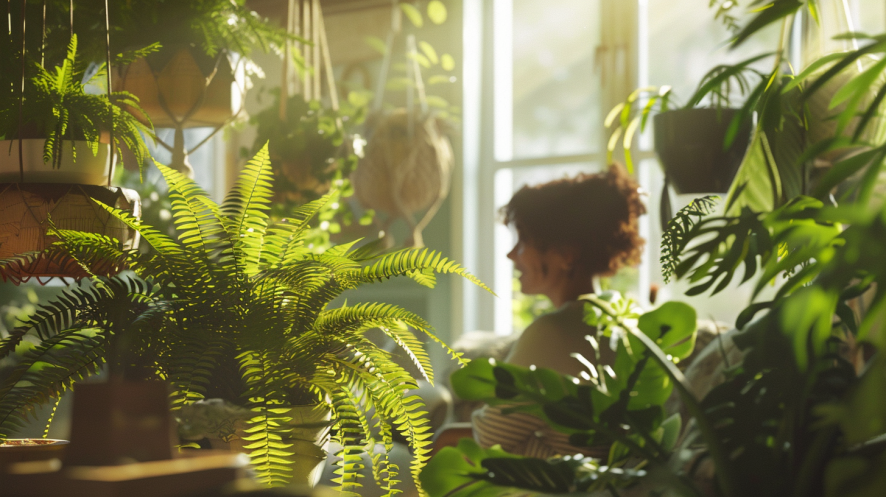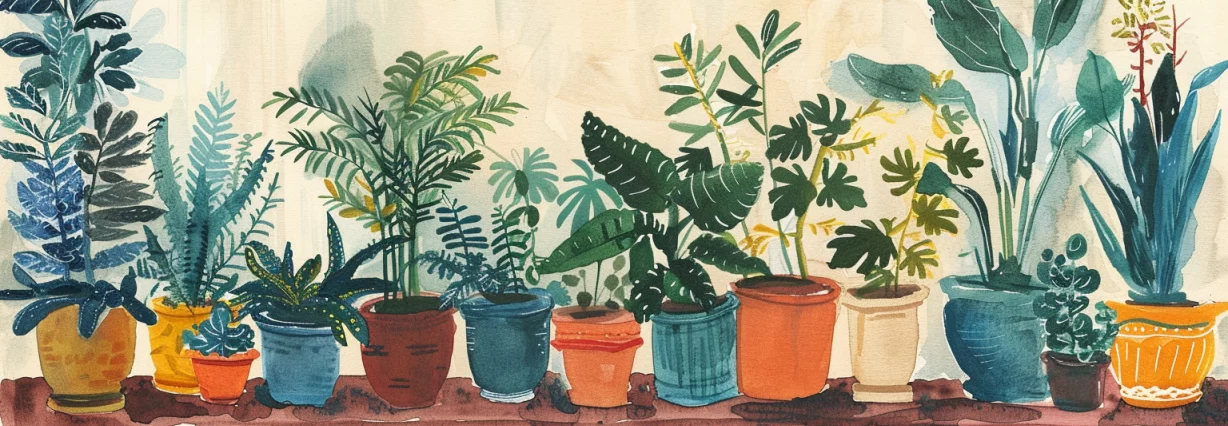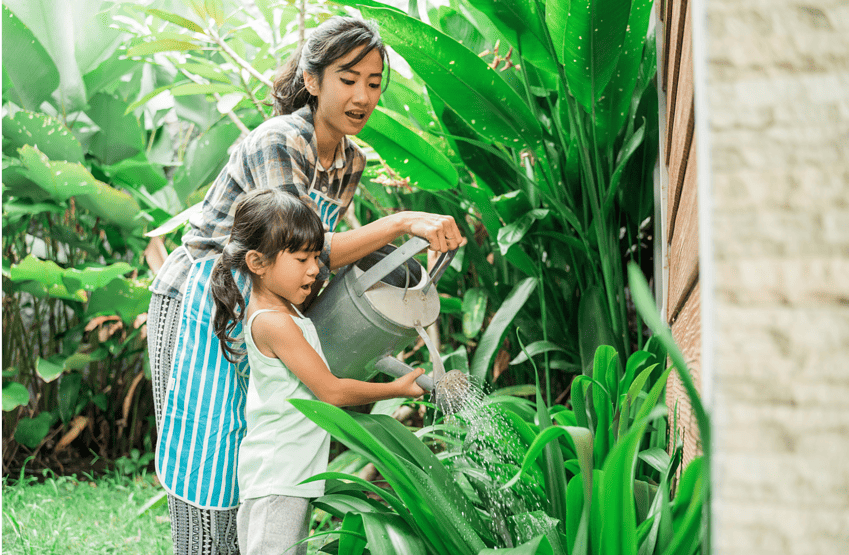Caring for houseplants has become increasingly popular in recent years. Many people turn to indoor gardening as a way to enhance their living spaces. However, the benefits of houseplants go beyond just aesthetic appeal.

Houseplants have been found to reduce stress, improve focus, and increase mindfulness. According to a study published in the Journal of Environmental Psychology, interacting with indoor plants can lead to significant decreases in physiological and psychological stress. Caring for houseplants encourages mindfulness and a sense of responsibility, which can contribute to one’s overall well-being.
In addition, houseplants have been found to improve indoor air quality, which can have positive effects on respiratory health. Certain plants, such as snake plants and peace lilies, have been found to absorb harmful pollutants and chemicals from the air. Overall, the therapeutic benefits of caring for houseplants make them a valuable addition to any living space.
Psychological Benefits of Houseplants
Houseplants have been shown to have several psychological benefits that can improve one’s quality of life. These benefits include reducing stress and anxiety, enhancing mood and creativity, and improving focus and productivity.
Reducing Stress and Anxiety
According to a study published in the Journal of Physiological Anthropology, interacting with indoor plants can significantly reduce stress levels. The study found that participants who interacted with plants had lower levels of cortisol, a hormone associated with stress, compared to those who did not interact with plants.
In addition, a systematic review of studies on the effects of indoor plants on human functions found that indoor plants can significantly benefit participants’ diastolic blood pressure and attention, both of which are related to stress and anxiety.
Enhancing Mood and Creativity
Caring for houseplants can also enhance mood and creativity. A study published in the Journal of Environmental Psychology found that interacting with indoor plants can increase positive emotions and reduce negative ones, such as sadness and anger.
Moreover, a review of studies on the psychological benefits of indoor plants found that they can enhance creativity and problem-solving skills. The review suggests that this may be due to the calming effect of plants, which can help individuals focus and think more clearly.
Improving Focus and Productivity
Indoor plants can also improve focus and productivity. A study published in the International Journal of Environmental Research and Public Health found that indoor plants can improve participants’ response time, which is related to productivity.
Furthermore, a study conducted by researchers at The Ohio State University found that plants can improve cognitive function, including attention and memory. This can lead to improved focus and productivity, especially in work or study environments.
Physical Health Advantages

Caring for houseplants has many physical health benefits. In this section, we will explore some of the most significant advantages of keeping indoor plants.
Purifying Air Quality
One of the most important benefits of indoor plants is their ability to purify air quality. According to a study published in the Journal of American Society of Horticultural Science, indoor plants are effective in removing volatile organic compounds (VOCs) such as benzene and formaldehyde from the air. These toxins are commonly found in household products such as cleaning agents, paints, and adhesives.
Some of the best indoor plants for air purification include Aloe Vera, Bamboo Palms, and Spider Plants. These plants not only remove harmful toxins from the air but also help to increase humidity levels, which can be beneficial for respiratory health.
Contributing to Heart Health
Indoor plants can also contribute to heart health. Studies have shown that being in the presence of indoor plants can lower blood pressure and heart rate, leading to a more relaxed state of mind. This effect is thought to be due to the calming influence of nature, which can help to reduce stress and anxiety levels.
Promoting Recovery and Healing
Finally, indoor plants can also promote recovery and healing. According to a study published in the Journal of Alternative and Complementary Medicine, patients who had indoor plants in their hospital rooms experienced faster recovery times and required less pain medication than those without plants. The calming effect of nature is thought to be responsible for this effect.
Cognitive and Emotional Support

Caring for houseplants is not only a satisfying hobby but also a therapeutic one. It has been found to offer cognitive and emotional support to individuals, especially those who are dealing with psychological stress, dementia, and concentration issues.
Aiding Attention and Concentration
Studies have shown that exposure to natural environments, such as green spaces, can help improve cognitive function. Caring for houseplants is an excellent way to bring nature indoors and reap its benefits.
According to a study published in the Journal of Environmental Psychology, having plants in the workspace can improve concentration and productivity. The study found that participants who worked in an environment with plants were 15% more productive than those who worked in a plant-free environment.
Supporting Dementia Patients
Caring for houseplants can also benefit individuals with dementia. A study published in the Journal of Gerontology found that horticultural therapy, which involves caring for plants, can improve the cognitive function and overall well-being of individuals with dementia. The study found that horticultural therapy improved the participants’ memory, attention, and orientation.
Fostering a Connection with Nature
Caring for houseplants can also foster a connection with nature, which has been linked to increased happiness and well-being.
A study published in the Journal of Positive Psychology found that spending time in nature can increase happiness and well-being. Caring for houseplants is an excellent way to bring nature indoors and reap its benefits. It can help individuals feel more connected to nature and, in turn, increase their overall well-being.
Horticultural Therapy and Wellness

Horticultural therapy is a practice that uses plants and gardening activities to improve the physical, mental, and emotional health of individuals. It has been shown to be effective in reducing stress, anxiety, and depression, as well as improving mood and overall wellbeing.
Therapeutic Gardening During the Pandemic
The COVID-19 pandemic has brought about a surge of interest in gardening and horticultural therapy. With social distancing measures in place, people have turned to gardening as a way to stay active, reduce stress, and connect with nature.
Horticultural therapy has also been adapted to meet the needs of individuals during the pandemic. For example, some horticultural therapy programs have provided virtual sessions to participants, while others have implemented safety protocols such as mandatory mask-wearing, social distancing, and regular disinfection of tools and equipment.
Integrating Plants into Wellness Practices
Integrating plants into wellness practices can be a simple and effective way to improve overall health and well-being.
Studies have shown that plants can purify the air, reduce stress levels, and improve cognitive function. In addition, caring for plants can provide a sense of purpose and accomplishment, which can boost self-esteem and confidence.
Some examples of how to integrate plants into wellness practices include:
- Creating a green space in the home or office
- Practicing mindfulness while tending to plants
- Incorporating plants into aromatherapy practices
- Using plants as a natural remedy for common ailments
Practical Aspects of Indoor Gardening

Indoor gardening is a rewarding and therapeutic hobby that can be enjoyed by anyone, regardless of their level of experience. In this section, we will explore some practical aspects of indoor gardening that beginners should consider when starting their own indoor garden.
Choosing the Right Plants for Beginners
When choosing plants for indoor gardening, make sure to consider the level of care required for each plant. For beginners, start with low-maintenance foliage plants such as Pothos, Snake Plant, Chinese Evergreen, and English Ivy. These plants are easy to care for and are resilient to a wide range of conditions.
Understanding Watering Needs and Pests
Watering is one of the most crucial aspects of indoor gardening. Overwatering or underwatering can be detrimental to plant health. It is essential to understand the watering needs of each plant and adjust the watering schedule accordingly.
In addition, pests such as spider mites, mealybugs, and scale insects can be a common problem in indoor gardening. Regular inspection and treatment can help prevent infestations.
Incorporating Plants into Various Spaces
Indoor plants can be incorporated into various spaces, including living rooms, bedrooms, kitchens, and bathrooms. Each space has its unique lighting and humidity requirements, so make sure to choose plants that can thrive in those conditions.
For example, plants that require bright, indirect light, such as Pothos and Snake Plant, are perfect for living rooms and bedrooms. Meanwhile, plants that prefer low light, such as Chinese Evergreen and English Ivy, are suitable for bathrooms and kitchens.
Social and Cultural Impact of Houseplants

Houseplants have become increasingly popular in recent years, not only for their aesthetic appeal but also for their therapeutic benefits. In addition to their positive impact on mental health, houseplants have also influenced social and cultural trends.
Houseplants and Social Media Influence
The rise of social media platforms such as Instagram and TikTok has played a significant role in the popularity of houseplants. Many users showcase their indoor gardens and share tips on plant care, inspiring others to incorporate plants into their own homes.
This has led to a growing community of plant enthusiasts who connect and share their love for plants online.
Moreover, social media has also created a market for houseplant influencers who monetize their content by promoting plant-related products. This has contributed to the growth of the houseplant industry and has made it easier for people to access a variety of plants and care products.
Plants as a Means of Companionship and Cheer
Houseplants have also become a source of companionship and cheer for many individuals. Caring for plants can provide a sense of purpose and fulfillment, especially for those who live alone or have limited social interaction.
Additionally, plants can help create a calming and nurturing environment, which can be beneficial for individuals dealing with stress or anxiety.
In some cultures, plants have also been used as symbols of luck, prosperity, and good health. For example, in Chinese culture, the money tree plant is believed to bring wealth and fortune, while the bamboo plant is associated with good health and longevity. Similarly, in Hinduism, the tulsi plant is considered sacred and is believed to have medicinal properties.
Environmental Benefits and Sustainability

Houseplants not only provide aesthetic value but also have numerous environmental benefits that make them an essential component of urban green spaces. In this section, we explore the positive effects of houseplants on indoor air quality as well as their role in enhancing urban green spaces.
Mitigating Indoor Environmental Pollutants
Indoor air quality is a significant concern, particularly in urban areas where people spend most of their time indoors. Houseplants play a crucial role in mitigating indoor environmental pollutants, including volatile organic compounds (VOCs) such as formaldehyde, benzene, and carbon monoxide.
Studies have shown that houseplants can reduce indoor air pollutants by up to 87% within 24 hours of placement in a room [1].
Houseplants are known to absorb and metabolize harmful chemicals, such as formaldehyde, benzene, and carbon dioxide, through a process called phytoremediation. This process involves the breakdown of harmful chemicals into less toxic compounds by the plant’s root system and microorganisms in the soil [2].
Enhancing Urban Green Spaces
Urban green spaces are essential for creating a sustainable and livable environment in urban areas. Houseplants can play a significant role in enhancing urban green spaces by providing a natural aesthetic value that promotes a sense of well-being and relaxation.
They also help to reduce urban heat island effects by cooling the surrounding environment through transpiration and shading [3].
Houseplants can be used to create green walls, vertical gardens, and green roofs, which help to reduce the carbon footprint of buildings. They also provide a habitat for urban wildlife, such as birds and insects, which contribute to the biodiversity of urban areas.
[1] Wolverton, B. C., Johnson, A., & Bounds, K. (1989). Interior landscape plants for indoor air pollution abatement. NASA.
[2] Kim, K. J., Kil, M. J., Song, J. S., & Yoon, J. Y. (2008). Removal of benzene and formaldehyde in indoor air by Fatsia japonica. Journal of hazardous materials, 160(2-3), 685-689.
[3] Jim, C. Y., & Chen, W. Y. (2008). Assessing the ecosystem service of air pollutant removal by urban trees in Guangzhou (China). Journal of environmental management, 88(4), 665-676.
Frequently Asked Questions

How do houseplants contribute to mental well-being?
Houseplants have been shown to contribute to mental well-being in several ways. For instance, caring for plants can provide a sense of purpose and accomplishment, which can boost self-esteem and confidence.
Additionally, the act of nurturing plants can be meditative and calming, which can help reduce stress and anxiety. Houseplants can also improve air quality, which can have a positive impact on overall health and well-being.
What psychological effects do indoor plants have on individuals?
Indoor plants can have several psychological effects on individuals. For example, studies have shown that indoor plants can improve mood, increase creativity, and boost productivity.
Additionally, plants can help reduce stress levels and improve concentration. The presence of plants can also create a calming and peaceful environment, which can help individuals feel more relaxed and at ease.
Can the presence of houseplants reduce stress levels?
Yes, the presence of houseplants can help reduce stress levels. Studies have shown that simply being around plants can have a calming effect on individuals.
Additionally, caring for plants can be a meditative and relaxing activity, which can help reduce stress and anxiety. The act of watering and tending to plants can also provide a sense of purpose and accomplishment, which can boost self-esteem and confidence.
What are the top benefits of incorporating plants into indoor environments?
There are several benefits to incorporating plants into indoor environments. For one, plants can improve air quality by absorbing toxins and producing oxygen.
Additionally, plants can help reduce stress levels, improve mood, and increase creativity and productivity. Houseplants can also create a calming and peaceful environment, which can help individuals feel more relaxed and at ease.
How does the act of watering plants impact human health?
The act of watering plants can have several positive impacts on human health. For one, it can be a meditative and calming activity, which can help reduce stress and anxiety.
Additionally, the physical act of watering plants can provide a low-impact form of exercise, which can be beneficial for overall health and well-being. Finally, caring for plants can provide a sense of purpose and accomplishment, which can boost self-esteem and confidence.
In what ways can taking care of houseplants be considered therapeutic?
Taking care of houseplants can be considered therapeutic in several ways. For one, it can provide a sense of purpose and accomplishment. This can boost self-esteem and confidence.
Additionally, the act of caring for plants can be meditative and calming. This can help reduce stress and anxiety.
Finally, caring for plants can create a sense of connection to nature. This can have a positive impact on overall health and well-being.


